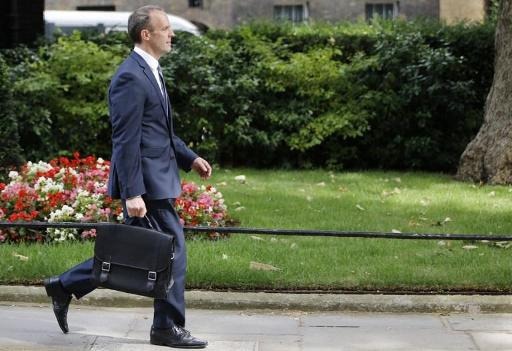The British Government was in crisis on Monday following the resignation of Brexit Minister David Davis, which further weakens the administration of Prime Minister Theresa May, hit by divisions within the majority on the future of the United Kingdom outside of the European Union (EU). Downing Street announced on Monday morning that Secretary of State for Housing Dominic Raab would replace Davis, who quit his post on Sunday evening, with less than nine months to go until Brexit. The 44-year-old Eurosceptic will have the tough task of representing the UK in negotiations on Brexit and doing battle with European leaders visibly tired of the British Government’s foot-dragging on the orientations to be given to the withdrawal.
The European Commission said on Monday that it did not see the resignation of Davis as a problem for the negotiations. “We will continue to negotiate in goodwill, bona fide, with Prime Minister May and the U.K. negotiators,” said EC spokesperson Margaritis Schinas.
The resignation came two days after a meeting between May and her ministers that resulted in an agreement on the will to maintain close trade relations with the EU. In his resignation letter, Davis said this would not enable the government to achieve the result the British people had voted for. "It will leave us in at least a weak negotiating position, and possibly an inescapable one,” he said.
Speaking on Monday on the BBC, Davis predicted that Theresa May would survive his departure from the Government, stressing that he had no intention at this stage to challenge her leadership. However, his resignation, which was followed by that of Brexit Secretary of State Steve Baker, put May in a vulnerable position since other pro-Brexit ministers were wondering if they should follow his footsteps and try to make her fall, journalist Jack Blanchard of the Politico online magazine argued.
Davis had been appointed in July 2016 to head the ministry created immediately after Britons voted to pull out of the EU, mainly because of his credentials as a convinced Eurosceptic. However, in the past few months there were flagrant divergences between Davis and May, and it was often rumoured that his resignation was in the offing, although he had always shown himself to be loyal to the British Prime Minister in public.
Reacting to his resignation, opposition Labour Party leader Jeremy Corbyn said it jeopardised the negotiations with the European Commission on Britain’s exit from the EU, scheduled for the 29th of March 2019. “David Davis resigning at such a critical time shows Theresa May has no authority left and is incapable of delivering Brexit,” he commented on Twitter, charging that her Government was “in chaos” whereas it has just presented its post-Brexit plan.
The plan, unveiled on Friday evening, includes setting up a free-trade area and a new customs model with the 27 EU States so as to maintain trade “without friction” with Europe. Before presenting it to Brussels, May was scheduled to discuss it on Monday with parliament and her Conservative Party. She was expected to describe the plan as the “good Brexit”, a Brexit that “is in the national interest”. However, the meeting was expected to be stormy, with May likely to come under attack from Conservative parliamentarians favourable to a hard Brexit.
Anti-Europe Conservative parliamentarian Jacob Rees-Mogg, for example, denounced the Government as defeatist. He vowed, in the Daily Telegraph, to vote against the plan and said he would not the only one to do so.
However, economic and financial circles generally welcomed May’s plan, seeing it as a gentle nod towards the “soft Brexit” they sorely wish for. British markets reacted favourably on Monday morning, with the pound sterling - the litmus test for investor confidence in the British economy - gaining a few points on the euro and the dollar.
Still, the business sector remained careful following the resignation of the former Brexit Minister, hoping that the Government would avoid other departures that could destabilise it even more. It also deplored the lack of details on the issue of trade in services with the EU, which represents a considerable share of Britain’s trade.
The Brussels Times

